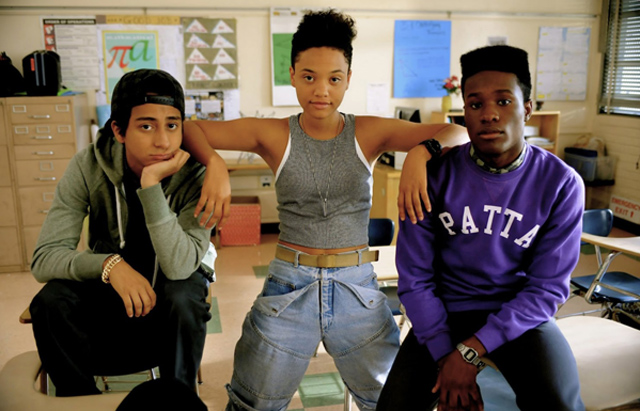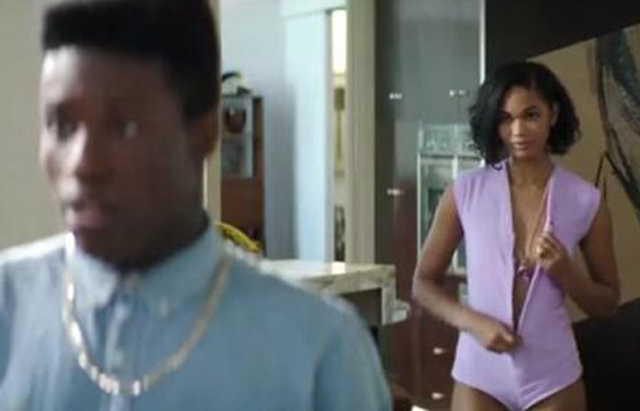CHICAGO – In anticipation of the scariest week of the year, HollywoodChicago.com launches its 2024 Movie Gifts series, which will suggest DVDs and collections for holiday giving.
Alternate American Dream Played Out in ‘Dope’
 Rating: 4.0/5.0 |
CHICAGO – If you’re lucky enough, you’ll never know what it’s like to grow up in a poor American neighborhood. But what if the notions of such societies are flipped on its ear, and what if the message draws attention to our current perceptions of race? This is what the new film “Dope” conveys.
I saw it as a fantasy of sorts, since the main character Malcolm seems to switch characteristics and points of view from scene to scene. He’s trying to solve a dilemma perpetuated by his adventures in the poor Los Angeles neighborhood of Inglewood, and inevitably offers a moral lesson through an application – naturally – to Harvard University. While the schizophrenic nature of Malcolm trips the story momentarily, it still can be interpreted as a through-the-looking-glass scenario – the streetwise version of the old 1980s film “Risky Business.”
Malcolm (Shameik Moore) is a self-described African-American high school geek, who loves 1990s hip-hop style and being a top student. He hangs around with two other fellow travelers, Diggy (Kiersey Clemons) and Jib (Tony Revolo, so memorable as the Lobby Boy in “The Grand Budapest Hotel”). They survive, barely, in their rough Inglewood neighborhood, but the tide turns quickly after a series of unintended consequences.

Jib (Tony Revolori), Diggy (Kiersey Clemons) and Malcolm (Shameik Moore) in ‘Dope’
Photo credit: Open Road Films (II)
Malcolm takes the gang to a party thrown by Dom (A$ap Rocky), who is also a drug dealer. When the party is raided, amid the gunfire and arrests Malcolm ends up “holding the bags” of pure Ecstasy. He must now come up with a plan to dump the drug, and visit all the players in the plan, including the whacked out Lily (Chanel Iman), his college sponsor Mr. Jacoby (Roger Guenveur-Smith) and a girl – who he desires to connect to – named Nakia (Zoë Kravitz).
Part “Malcolm in Wonderland” and “Wizard of Oz” (if the Wizard ran a check-cashing franchise), the film addresses many formulas of African-American lives in poor neighborhoods and perceptions of those lives by outsiders. It is inevitably about the American Hustle, and Malcolm takes on the traits of all the hustlers that we can think of – he becomes a technology master, a steely-eyed threat machine, a streetwise influence player and a lead singer in a punk rock band – all within the limited confines of his so-called geek construct. Do these inconsistencies matter? More on that later.
The film has its energy in the performances, from Shameik Moore’s Malcolm, and his crew, to the strange and mystical Roger Guenveur-Smith portraying a “millionaire” benefactor who also tests Malcolm’s powers. Special notice goes out to Chanel Iman as Lily, who was asked to perform partially nude most of the time, plus demand to urinate after ingesting too much Molly, and then get publicly chastised for doing so – you won’t find an actress anywhere willing to be that free. The way the actors buy into the almost surreal happenings is definitely part of the film’s strong suit, and adds a specific tension to every scene.
There is also an argument that the whole thing is a satire. That the “geek” self-description of Malcolm is an absurd falsity or even a fantasy deception. Writer/director Rick Famuyiwa piles on outsider or white people notions of “the hood” in Malcolm’s personality. If you recall “Risky Business,” Tom Cruise is the epitome of white privilege in the midst of his “business.” Famuyiwa flips the lid on this in “Dope,” and wags a middle finger to “Risky Business” at the same time.

Malcolm Encounters Lily (Chanel Iman) in ‘Dope’
Photo credit: Open Road Films (II)
There is a beautifully set-up monologue from Malcolm at the end of the film, regarding perceptions and realities, and it does forgive some of the inconsistencies of his character throughout the story to that point. The fictional Malcolm becomes everything we think he is, as he luxuriates into several components on screen – do we empathize with him or criticize him? That question is something that everyone has to answer through their perspective, and becomes the tipping point of “Dope.”
I am observing that the summer films of 2015, beyond the blockbusters and the “tent pole” pictures, has some surprising counter programming. The distributors are rolling the dice against the usual superheroes, animated films and flamboyant popcorn movies. “Dope” makes us think and is a carnival ride of strange fun, which is all part of a memorable summer as well.
 | By PATRICK McDONALD |


